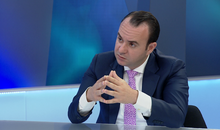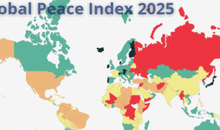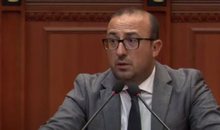
 Flash News
Flash News
Accident in Lezha, 69-year-old loses control and hits 4 parked vehicles
Accident in Lezha, car ends up in the parking lot of a playground
Report/ Albanian healthcare between limited transparency and under-financing
Accident on the Fier-Vlora axis, car goes off the road, 3 injured
State Matura, mathematics exam results published
Report/ Albanian healthcare between limited transparency and under-financing

The Together for Life Association published its annual report “Health Sector Expenditure Monitoring for 2024”, an in-depth document that analyzes not only last year’s budget figures, but also how they affect the real provision of health services to citizens. This report, like previous ones, raises concerns about the under-financing of health, the lack of transparency in reporting, and the incomplete alignment between commitments and concrete results.
While the Ministry of Health and Social Protection’s budget for 2024 reached nearly 80 billion lek, an increase of 1.8 billion lek from the initial plan, analyses show that public funding for health continues to remain among the lowest in the Region, at only 2.8% of GDP and 9.6% of total public spending. Furthermore, more than 51% of healthcare spending continues to be borne out of citizens’ pockets.
In particular, the report highlights that funding for Primary Health Care has been reduced by 245 million lekë during 2024, without any analysis or official explanation from the authorities as to the reasons for this reduction. This is particularly concerning, given that a new service – home health care for patients with mobility impairments – has also been included in this category, which should be accompanied by an increase in funding.
The report also raises concerns about the continued financing of the check-up concession, which continues to be based on the planned number of beneficiaries and not on the actual number of citizens receiving the service. For 2024 alone, 23.8 million lek were paid to 13,624 citizens who did not actually benefit from the service.
The removal for the second consecutive year of financial support for the “Patients with Down Syndrome” product in the secondary healthcare program, without any explanation or justification from the authorities, raises serious concerns. The lack of transparency regarding the reasons for this decision could have significant consequences for access to necessary healthcare for a category that requires continuous and specialized follow-up, and risks deepening inequalities in the healthcare system.
The findings of the report "Monitoring Health Sector Expenditures for 2024", carried out by the Together for Life association, with the financial support of the National Endowment for Democracy, were shared at a roundtable attended by representatives of institutions, patient organizations and organizations operating in the field of transparency and accountability, experts in the field, and the media.
The representative of the People's Advocate, Ms. Lindita Xhillari, a participant in the roundtable, praised the role of the TFL reports in the process of drafting institutional recommendations: “Your reports are very detailed and have been a reference point for the recommendations that the People's Advocate addresses to the Ministry of Health every year. The findings you have presented are specific and different from the nature of our work, but will be included in our future work.” Focusing in particular on the lack of data on the budget for children with Down Syndrome, the representative of the People's Advocate emphasized that the issue identified in the report on the removal of the budget for patients with Down Syndrome “will be in focus for monitoring and for exerting positive pressure for a solution.”
Emerlinda Pema, representative of the Office of the Commissioner for the Right to Information, praised the report's role in increasing transparency: "Such reports are valuable not only for citizens, but also for institutions. Your findings and recommendations are read with great attention by us." She added that, based on the TFL reports, 12 recommendations were made this year for transparency programs in public hospitals, to ensure the publication of annual budgets, audit results and procurement plans. "We oversee the implementation of the law on the right to information and now also of the new law on open data. This law requires that all public data be published in 'open data' format, so that researchers and citizens have full access."
The report provides a valuable basis for independent institutions, which focus their work on the protection of human rights, where the right to access public health services is one of the basic rights, and comes as a call for responsible institutions, in particular the Ministry of Health and Social Protection, to increase accountability in the management of public funds in the health sector in order to achieve the primary objective of universal health coverage.
Latest news


Race for the head of BKH/ Bushati: Only those who bow down make a career
2025-06-26 22:41:37
Lapaj: We can merge into a party with 'Nisma Thurje'
2025-06-26 22:25:53
Vote recount, Lubonja: Electoral manipulation took place before May 11
2025-06-26 22:12:23
Health Center inside the sports field, the wonder of the next project in Lushnje
2025-06-26 22:00:10


"The Task Force acted selectively"/ Bushati: SPAK was a government tool!
2025-06-26 21:33:19



Accident in Lezha, 69-year-old loses control and hits 4 parked vehicles
2025-06-26 20:51:34


KPA upholds dismissal of judge Avni Sejdi
2025-06-26 20:15:54



Accident in Lezha, car ends up in the parking lot of a playground
2025-06-26 19:35:03
Special court for the war in Ukraine, Zelensky signs the agreement in Strasbourg
2025-06-26 19:17:43



Report/ Albanian healthcare between limited transparency and under-financing
2025-06-26 18:34:34

Rama returns to Parliament after 6 months of absence
2025-06-26 18:14:37

Greece on fire, several houses burn in Athens, residents evacuated
2025-06-26 17:46:29

The College rejects the DP's request for the Vlora region
2025-06-26 17:29:18



Accident on the Fier-Vlora axis, car goes off the road, 3 injured
2025-06-26 16:17:52
State Matura, mathematics exam results published
2025-06-26 16:05:33
Don't get burned by carelessness: Six mistakes that make sunscreen useless
2025-06-26 15:58:18
Caught with cocaine, 26-year-old arrested in Saranda (NAME)
2025-06-26 15:50:42
What does 5% of GDP on defense mean?
2025-06-26 15:42:39

Extreme heat wave, temperatures above 40°C next week
2025-06-26 15:26:12
State Matura/ Mathematics test results published, only 166 excellent students
2025-06-26 15:07:10
Race for BKH leader, 6 candidates disqualified, reason
2025-06-26 15:07:10
Have Sarah and Dj Pm broken up? Einxhel reveals the truth
2025-06-26 14:56:12

Neighbor's daughter stoned and police officers shot, two brothers arrested
2025-06-26 14:37:03
GJKKO leaves Ilir Meta in prison
2025-06-26 14:20:19
Anesthesiologist at QSUT, Nertila Kodra Gora, passes away
2025-06-26 14:20:04
Ilir Meta's defense arguments in the GJKKO are revealed
2025-06-26 14:00:15
5 super healthy foods you should add to your diet
2025-06-26 13:47:51

Anatomy of a crime
2025-06-26 13:24:08
Don't cover your baby's stroller on hot days like these, here's why
2025-06-26 13:06:01
Iran's Supreme Leader reacts for the first time after the conflict with Israel
2025-06-26 12:58:27


Special Appeal makes decision for former judge Guxim Zenelaj
2025-06-26 12:17:01
Will Smith poses next to the Albanian footballer, making the double-headed eagle
2025-06-26 12:07:10








Vacation? Not for us
2025-06-26 10:20:50
When the camps become an "honor" for Italy and a "shame" for Britain
2025-06-26 10:10:21
SPAK leader demands dismissal of Ermonela Felaj's sister
2025-06-26 09:59:39

Why is it so difficult for us to get a good night's sleep?
2025-06-26 09:40:20
Iran: Complete destruction or just minor damage?
2025-06-26 09:27:53
Donald Trump demands immediate cancellation of Netanyahu's trial
2025-06-26 09:19:46
Thousands of cannabis roots found and destroyed in Shkodra, 4 prosecuted
2025-06-26 09:10:50

Costly experiment: Italy weighs costs of migrant centers in Albania
2025-06-26 08:54:01
Election effect, employment in the state reaches record in the first quarter
2025-06-26 08:40:21
Parliament in plenary session, draft laws expected to be approved
2025-06-26 08:29:34
Horoscope, what do the stars have in store for you today?
2025-06-26 08:12:59
Parashikimi i motit, temperaturat arrijnë deri në 37 gradë
2025-06-26 07:58:10
Posta e mëngjesit/ Me 2 rreshta: Çfarë pati rëndësi dje në Shqipëri
2025-06-26 07:45:04
CIA chief: Iran's nuclear facilities 'severely damaged' by recent attacks.
2025-06-25 22:53:09
NATO spending to increase by 5%, diplomat: Aims to pull economies out of crisis
2025-06-25 22:32:28

Djegia nga dielli, ja disa mënyra si ta trajotni në kushte shtëpie
2025-06-25 21:56:19

Rama: NATO Summit in 2027 will be held in Tirana
2025-06-25 21:36:35
What is known about the weapons that Serbia has banned from exporting to Israel?
2025-06-25 21:23:19


The new war front? Not in the Middle East, but in SPAK!
2025-06-25 20:40:02

Gjendet e vdekur 56-vjeçarja shqiptare në Greqi! Nënë e 3 fëmijëve
2025-06-25 20:21:03
PHOTO/ Car falls off bridge on Peqin-Elbasan axis
2025-06-25 20:11:16

Trump at NATO summit: In recent weeks we have dealt with Kosovo and Serbia
2025-06-25 19:47:10




